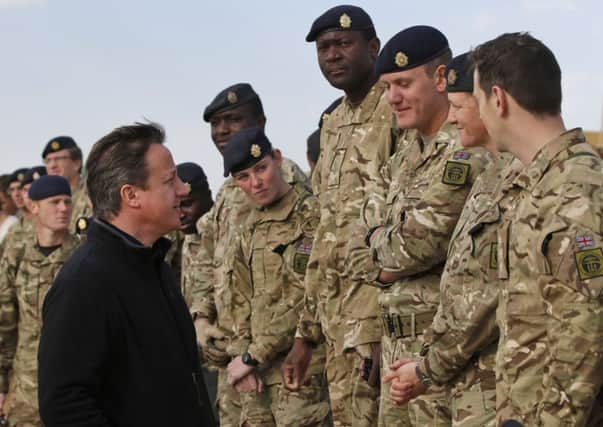Leaders: Battle could never be won in Afghanistan


Of course, it is entirely understandable that the prime minister should want to visit troops in a faraway place with a hostile climate and people, and who have endured daily dangers and seen many of their colleagues killed and mutilated. Of course he should, on behalf of the nation, thank them.
Theirs has been a truly thankless task. Out there, they had to view every Afghan as a potential threat; back home, people have increasingly questioned what they were doing there and whether they were achieving anything at all. Now Mr Cameron’s answer is: “A basic level of security has been achieved.” That, however, has taken more than 12 years and cost 446 British lives. Many, many more Afghans have died, some of them enemy insurgents, but many of them civilians caught in the cross-fire and other mistaken tragedies of modern warfare.
Advertisement
Hide AdAdvertisement
Hide AdEven now, bombings and shootings are still commonplace in Kabul, the capital, in what ought to be the safest and most secure place in Afghanistan. If this is a “basic level of security” one pities the poor folk in the rest of the country.
Mr Cameron did not start this war and to be fair to him, he is ending British involvement in it, albeit in merely following US President Barack Obama’s lead. So he could have been more honest with the troops and told them that they made the very best of what was a bad job given to them by politicians.
Back in 2001, in the aftermath of the terrorist attacks on New York, it may have seemed like a good idea to political commanders to destroy the al-Qaeda bases in Afghanistan where the destruction of the World Trade Centre was planned, and to oust the Taleban regime then in power in Kabul and which allowed al-Qaeda to thrive on their territory.
If that ever had a slight chance of enduring success, Western politicians promptly blew it by ignoring the need to build a nation, to provide work and by imposing American-style democracy on a culture which was inimical to it and where there was no democratic tradition. And this in a country which has known nothing but death and oppression from invading armies and had little reason to expect that this latest one would be any different.
Mission accomplished? No, the mission always was unaccomplishable. This was a stupid war. That means no disservice to the armed forces or their bravery. The battle against global terrorism never was going to be won by the occupation of one small corner of the globe.
Hunt for Locerbie truth still on
When the two who were originally accused of acting to blow up the Pan Am airliner which crashed on Lockerbie were put on trial, a big piece of the jigsaw of conspiracy was missing from the trial – those who ordered the bombing. Their absence meant that the two accused looked like lone individuals rather than the tools of their higher authority.
That created a vacuum in which conspiracy theories alleging other plots and other actors have flourished. The final piece of proof which would dispel those theories and show that Abdulbaset al-Megrahi was indeed guilty has always been out of reach.
But now that Colonel Gadaffi’s regime, believed to be the state sponsors of Mr al-Megrahi’s crime, has been deposed, the search for those guilty higher up the chain of command can take place.
Advertisement
Hide AdAdvertisement
Hide AdThough conditions in Libya are still chaotic, two special prosecutors have been appointed to assist Scottish authorities and the FBI to find those, or evidence of those, with blood on their hands. Lord Advocate Frank Mulholland is surely right that it is inconceivable that responsibility for that evil act lies only with the man who put the bomb on the plane.
This was the biggest mass murder to have occurred in Scotland. It may have happened 25 years ago, but it cannot be right not to pursue every available avenue to find those who bear ultimate responsibility. Establishing the full truth of the events that led up to that dark night, and who were the actors putting those events in motion is important, for the relatives, for justice, and for giving the world an irrefutable full and final account of who conceived and planned the real and heinous conspiracy.